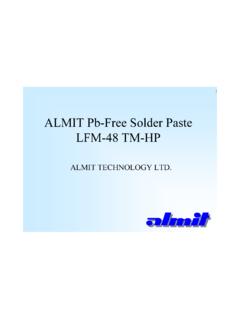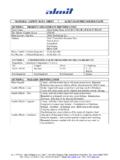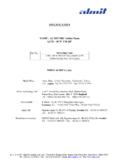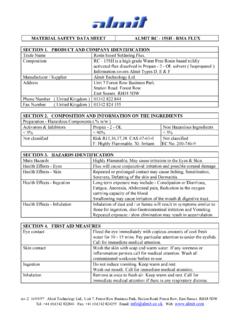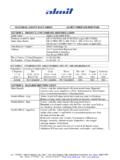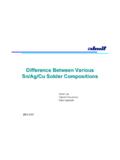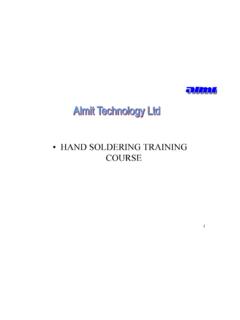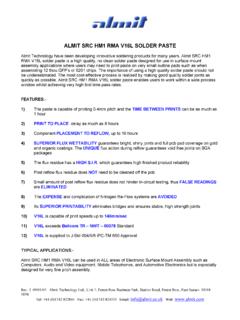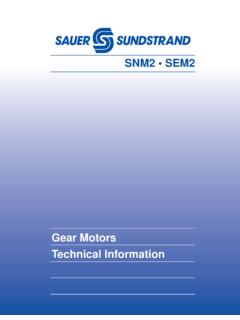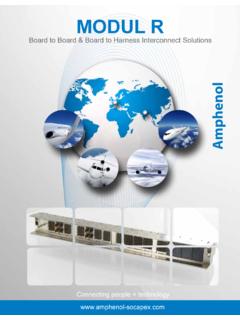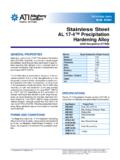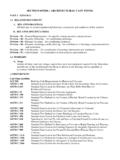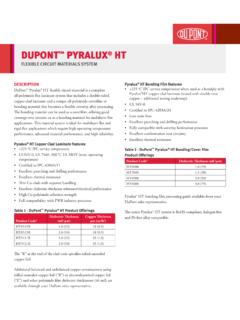Transcription of Why Lead-free? - Almit
1 Why Lead- free ? Unit 7 Forest Row Business Park Station Road Forest Row East Sussex RH18 5DW. Tel: +44 (0) 1342 822844 Fax: +44 (0) 1342 824155 email: Almit GmbH Tel: +49 (0) 7142 773327 Almit AB Tel: +46 3134 00270. The Move to Lead- free Solders Introduction A very important issue which will ultimately concern manufacturing operations throughout the World is the pending conversion to Lead- free solders. At present, there is no legislation on the matter. However, there are a number of EU documents on waste from electrical and electronic equipment (WEEE) that have been adopted, and may become law by 2004. Where European vehicle electronics are concerned, by 2003. The ROHS directive intends to eliminate Lead in electrical and electronic equipment by December 2004. The main thrust of Lead- free legislation originated in the USA. Latterly, it has moved onto Japan, and now into Europe. Most progress by way of research, development and manufacture has stemmed from Japan, with the result that certain types of Lead- free products are now directly available from Almit .
2 It would appear, however, that proposals at this stage exclude Aerospace/Military applications, whilst separate legislation is expected for motor vehicle applications. The proposed legislation also purports that the export and import of designated materials, ( products containing Lead), will not be allowed into the EU nor will export be permitted. Certain sectors of the OEM UK electronic production market are already up and running with Lead- free solders. The motor and mobile telecommunications industries, test trials were positive and as a result have succesfully introduced products containing Lead- free solders onto the market. Why is it necessary to go Lead- free ? Manufacturing and QA management have rightly posed the question as to why it is necessary to go Lead- free , since there is little evidence of lead solder being harmful to users. The answer really boils down to the fact that when lead is in direct contact with the skin, little or no absorption takes place, it is only harmful when ingested through the eyes, nose or mouth via dust, fumes or from soiled hands.
3 The use of preventatives, such as goggles, gloves and other hygiene measures reduces the risk, but its removal from the manufacturing process has to be seen as a sensible and positive move for any organisation whose concern with the health and safety of their operatives is paramount. Unit 7 Forest Row Business Park Station Road Forest Row East Sussex RH18 5DW. Tel: +44 (0) 1342 822844 Fax: +44 (0) 1342 824155 email: Almit GmbH Tel: +49 (0) 7142 773327 Almit AB Tel: +46 3134 00270. Environmental concerns What is not so apparent is the wider environmental effect of any product using traditional Tin/Lead solder alloy or any form of Lead, when it reaches the end of its useful life. Recycling back to base metal is currently carried out by just five companies worlwide, the logistics of the supply chain from last user to recycler proving somewhat difficult. The majority of recycled Lead seems to finish up in car batteries.
4 Solder suppliers prefer virgin material, although as Lead is phased out this supply will diminish. It is estimated that scrap electronic material accounts for over million tons per annum, of which approximately 24,000 tonnes are made up of Lead in the solder joints. (Based upon an annual world consumption of 60,000 tonnes of 60/40 solder). The bulk of this material currently ends up in landfill sites, and since rainfall has become more acidic, this acid rain is leaching more and more of the Lead into the ground water and ultimately into water supplies of both plant and animal life. Since we are at the top of the food chain, it all ends up in us. There is little that can be done with current waste levels. However, the sooner Lead is removed from the production process and subsequent waste streams, the sooner Lead levels will start to fall. Water companies remove Lead and other heavy metals from domestic supplies with a target level of 10.
5 Parts per billion. Recent reports indicate that levels of Lead in the bloodstream have fallen with the introduction of Lead- free petroleum. Why Pb free Solder is necessary? 1) Pb influence on the human body. Accumulation in the human body inhibition of growth acid rain affect on the central nervous system polluted water inhibit the formation of hemoglobin deterioration of mental powers discarded electronics products groundwater pollution by Pb absorption Unit 7 Forest Row Business Park Station Road Forest Row East Sussex RH18 5DW. Tel: +44 (0) 1342 822844 Fax: +44 (0) 1342 824155 email: Almit GmbH Tel: +49 (0) 7142 773327 Almit AB Tel: +46 3134 00270. What action should a manufacturer take? Depending on the infrastructure of your company and how important this issue is to the daily operations, there are a number of possibilities: 1. You could wait until legislation requires implementation and then be forced into action.
6 2. You could keep up-to-date with developments, seek advice from Lead- free solder manufacturers and run pilot schemes until legislation makes action mandatory. 3. Carry out the above and run your pilot schemes through to full production builds. Legislation, which most observers feel is inevitable, will almost certainly allow a period for changeover. Like all new technology, it will have imperfections but will, no doubt, be refined as experience is gathered. Toxicity The alloys of Lead, Thallium and Cadmium, although possessing excellent properties are excluded on the grounds of toxicity. Tin, Copper, Silver, Bismuth and Antimony have, on the other hand, been given a clean bill of health. Tests on the Almit low-Lead solder have shown that leaching of Lead into ground water is so low as to be disregarded. The position of low-Lead solder is yet to be defined, so at this stage zero Lead content has to be the option.
7 Low-Lead solders are, however, an environmentally-friendly option until a full ban is imposed. Unit 7 Forest Row Business Park Station Road Forest Row East Sussex RH18 5DW. Tel: +44 (0) 1342 822844 Fax: +44 (0) 1342 824155 email: Almit GmbH Tel: +49 (0) 7142 773327 Almit AB Tel: +46 3134 00270. The choice and availability of metals The world consumption of Tin/Lead alloy is in excess of 34,000 tonnes and increasing. Thus, each 1%. addition of a replacement metal will require in excess of 340 tonnes per annum. It can be seen from the table below that this eliminates Indium (and also Gallium) as major constituents of a global alloy, aswell as their high cost. Recently, Indium stood at $150/lb whereas, Tin cost $3/lb. The addition of high levels of Indium reduces the melting point, but is detrimental to fatigue strain properties. Additionally, a low temperature soft phase is created. The position with Silver and Bismuth is less clear; Silver has always been an expensive metal and an increase in demand will see prices soar.
8 Other metals, such as Zinc, Tin, Antimony, Copper and Magnesium are readily available in sufficient quantities to meet the anticipated new demands. Bismuth is a by-product of Lead extraction, so prices may rise as the mining of Lead decreases. As electronic assemblies become smaller, it is logical to assume that solder usage will also be less. However, this is negated by increasing production. Any new alloy must be available in the long term and at prices that are generally acceptable to the manufacturer. Initially, costs will be higher but should eventually reduce as volume increases. Metal Cost Ratio* Spare Capacity Potential Lead Unlimited Unlimited Tin 180 Available Copper 4900 Available Indium ** Scarce Silver Limited Bismuth 9 Limited Antimony 100 Available Zinc 1560 Available * based on approximate figures London Metal Exchange, August 1998. ** highly volatile What is certain, however, is that manufacturers of components and PCB fabricators should be approached as to what action is being taken, bearing in mind that Lead content components may be in the supply chain for some years.
9 Stocks may become unusable by law unless a minimum Lead level is permitted. The current legislation projection is zero. Board level decisions will be required concerning Articles 5,6,7 and 8 WEEE 27th July 1998 as the financial burden may be substantial. Recycling is to be the manufacturer's responsibility at NO. COST to the consumer. Unit 7 Forest Row Business Park Station Road Forest Row East Sussex RH18 5DW. Tel: +44 (0) 1342 822844 Fax: +44 (0) 1342 824155 email: Almit GmbH Tel: +49 (0) 7142 773327 Almit AB Tel: +46 3134 00270. Which Alloy? The family of Tin/Lead soldering alloys has been around since the dawn of electronics, and it is almost impossible to imagine the industry without it. In fact, the almost 100% dependance on a process that until recently had no commercially viable alternative is probably unique in manufacturing. For electronics assembly, solder has a list of attributes that make its exact replacement difficult, if not impossible.
10 Its many characteristics makes a hard act to follow for any replacement alloy. It's true to say that the electronics industry has been built around Sn/Pb solders and could not exist without it, at least in its present form. One factor often overlooked is solders' universal application An electrical assembly manufactured, say in America 60 years ago, can quite easily be repaired in Japan using vitually identical methods and materials to produce a 100% compatible joint. The traditional Sn/Pb family of alloys are to all intents and purposes identical and interchangable, and together represent almost 100% of solder used worldwide. Speaking at a Lead- free summit in Minneapolis USA, in 1999, Jim McElroy, Executive Director and CEO. of the National Electronics Manufacturing Initiative (NEMI), a consortia of US companies called for a single standard (Lead- free alloy) solution with which to move forward.
